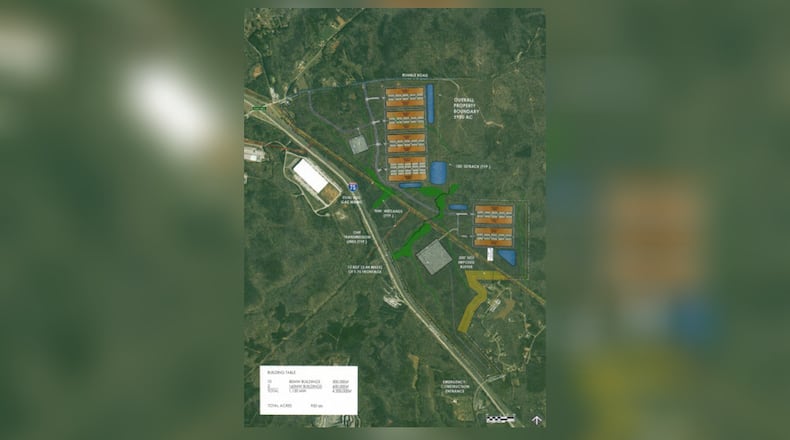Imagine a dozen buildings stretching farther than the eye can see, combining to have enough floor space to fill the Mall of Georgia more than twice.
Now, fill that space with seemingly endless rows of computer servers that need more electricity than the entire output of one of Plant Vogtle’s two new nuclear reactors.
That’s what a data center developer envisions for a 950-acre property along I-75 in Monroe County, about 70 miles southeast of downtown Atlanta. It’s the latest computer server farm project to gain traction near Atlanta as the region emerges as an industry darling.
New York-based Datacore Innovations detailed its Monroe County project called Rumble Technology Campus in a Monday development of regional impact filing, also known as a DRI. It’s a state infrastructure report that evaluates projects that have a large enough scope to impact multiple jurisdictions.
The developer, which did not respond to requests for comment, is seeking to rezone a portion of the property from agricultural to allow for roughly 4.2 million square feet of data center space to be built across 12 buildings along Rumble Road. The project’s build-out value is estimated at $1.1 billion and will employ between 30 and 50 full-time employees, according to a September rezoning application.
Data centers are effectively warehouses filled with rows of computer equipment that power the internet, cloud services and the AI movement, and they’ve become one of the most desired uses for undeveloped land in metro Atlanta. By midyear, data center construction had increased 76% in the Atlanta market compared to the same time last year, the most among North America’s eight data center primary markets, data from real estate services firm CBRE showed.
The most common way to measure the size of a data center is by the power it consumes. And right now, there is more leasable data center space under construction as measured by power demand than there is total leasable data center space in metro Atlanta currently in use — the only major market in the country with such high demand, CBRE said.
The multiphase Rumble Technology Campus, which is projected to be completed by the end of 2038, has an estimated electricity demand of 1,120 megawatts. That’s slightly more than the output of one of Plant Vogtle’s two new nuclear reactors, each of which can produce enough electricity to power about 500,000 homes.
Developers tout the promises of high-paying tech jobs and property tax dollars to local governments and schools, but the state and many city and county development authorities dangle huge incentives to land the campuses. It’s unclear whether Datacore was offered any incentives for Rumble Technology Campus, and Monroe County officials did not immediately respond to a request for comment.
Credit: Microsoft
Credit: Microsoft
“Unlike industrial and warehousing projects, which call for mass grading, this project will only be graded around the proposed building sites,” Datacore wrote in its rezoning application, arguing its project will preserve more green space than other industrial developments.
The sheer amount of data center space poised to come to Georgia has become a point of contention for utilities, regulators and the communities targeted for these facilities. The centers require huge amounts of electricity and water to cool them, take up large swaths of land and typically create only a few dozen permanent jobs.
Douglas County, a hotbed for data centers, is poised to add another big name to its roster.
Amazon Web Services, the cloud computing platform for online retail giant Amazon, paid more than $37 million to acquire 118 acres of undeveloped land along Rock House Road near the border of Douglas and Cobb counties. Developer Taylor & Mathis, which previously filed a DRI to pursue a data center campus on the land, was the property’s seller. The Sept. 11 transaction was first reported in the Atlanta Business Chronicle.
An Amazon Web Services spokesperson said the company is “constantly evaluating new locations based on customer demand,” adding that the Douglas County land acquisition is being evaluated for “possible data center locations.”
About the Author
Keep Reading
The Latest
Featured




